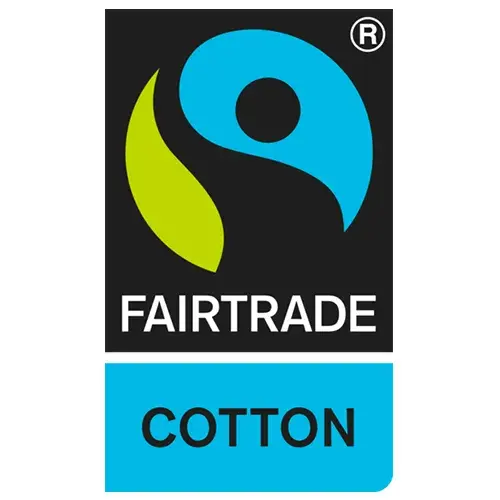Almost every consumer knows the Fairtrade seal, which provides guidance when buying products such as cocoa, coffee, nuts, bananas or textiles. Fair business, for which the label stands, places great emphasis on the protection of workers' rights and the environment. The economic dimension also plays a role – it is closely linked to the protection of workers and farmers who cultivate the raw materials.
For example, cotton is purchased from producers at a fair minimum price. If they grow their cotton organically, they also receive a bonus. This takes into account the higher costs of organic cultivation and thus motivates the farmers to switch to organic cultivation or to maintain it. The bonus has an effect that goes even further: It gives farmers and their families the chance to improve their daily lives, for example by providing education and better health care. To qualify for this payment, farmers must work in an environmentally friendly way and without the use of genetic engineering. In addition, there are clear regulations on which pesticides are allowed.
Companies that want to have their products certified contact TransFair e.V. The organisation negotiates corresponding licence agreements with the companies, which commit themselves to comply with the Fairtrade standards. These include the empowerment of farmers and workers, environmental protection and fair business conditions.
Workwear from Fairtrade cotton
Fairtrade also plays an increasingly important role in workwear. More and more municipalities and companies pay attention to sustainability in tenders and procurement. CWS also leads the way here and was the first supplier to launch a workwear collection made from 100 percent Fairtrade cotton back in 2017. In 2020, the decision was made to use fair cotton for all standard collections. To realise this, the company relies on the Fairtrade raw material seal for cotton called "Supporting Fairtrade Cotton". The idea: After consultation with CWS, the supplier buys the amount of Fairtrade cotton needed for the production of the garments. If there are supply bottlenecks, they can fall back on conventional cotton. In this case, they commit to purchasing and processing the shortfall within the next six months. Quantity compensation enables smallscale farming families to participate in the trade even if they cannot offer large batches of cotton. Manufacturers, meanwhile, benefit from more planning security.
For CWS, Fairtrade cotton is an integral part of its sustainability strategy and of Think Circular! Workwear made from 100 percent Fairtrade cotton that can cannot be repaired returns to the cycle. In addition, the company thus contributes to promoting the ecological cultivation of cotton.
| Think Circular – CWS‘ Sustainability approach CWS sees itself as an active part of the circular economy and always thinks in cycles. This involves the three logical steps of Reduce, Reuse and Recycle. With its circular business model, the company contributes to a healthier and safer tomorrow. In addition to the constant task of improving sustainability factors, CWS also uses several sustainability labels to identify its products and services. |
